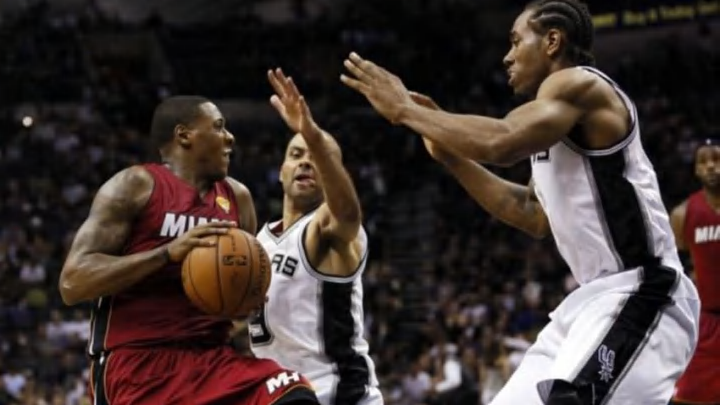The Miami Heat are fueled by their big three—LeBron James, Dwyane Wade, Chris Bosh. That’s no secret.
But it might be the player known as the little brother to the big three, point guard Mario Chalmers, who holds the key to the Heat’s potential success in Game 2 of the NBA Finals Sunday night.
I don’t think I’m handling as much as I was in previous playoffs. But it’s something coach made an adjustment to. I’ve just got to figure out a way to be effective. – Mario Chalmers
Chalmers doesn’t play the traditional point guard role for Miami—far from it. While the offense is triggered by James or Wade, Chalmers’ job is to defend the other team’s point guard primarily and to get himself open looks and when he has the basketball to take care of it.
How little is he asked to do? His usage rate in this postseason of 14.7 percent is seventh among players getting regular minutes in the rotation, obviously behind le trio grande, but also behind the likes of Ray Allen, James Jones and Rashard Lewis.
In Miami’s 12 playoff wins this season, Chalmers averaged 7.4 points, 3.8 assists and 2.3 rebounds per game, with a shooting slash of .459/.393/.769 in 26.8 minutes. That’s a small sample size, sure.
An even smaller sample size is the Heat’s four losses, but a trend emerges.
In more playing time (28.8 minutes per game), Chalmers is less productive. How much less? Try five points, 3.3 assists, three rebounds, 1.5 steals on a slash line of .368/.444/.667.
Chalmers was particularly ineffective in Game 1. He got into early foul trouble, played only 17 minutes and finished with three points, three steals, one rebound and one assist along with five turnovers.
He did knock down his only 3-pointer, but was 0-for-2 from inside the arc and was a non-factor for the Heat.
In fairness, ‘Rio’s been a non-factor for awhile now. His last double-figure scoring game was a month ago today, when he scored 11 points in the Heat’s Game 2 win over the Brooklyn Nets in the conference semifinals.
To that point, the Heat’s first six games, Chalmers was averaging 9.8 points per game and shooting .478/.438/.727.
But in Miami’s last 10 playoff games, during which the Heat are just 6-4, the sixth-year guard from Kansas is averaging five points a game and shooting .404/.381/.800.
Probably his best individual performance over that span was in Miami’s Game 5 loss to the Indiana Pacers in the Eastern Conference Finals, when he was 3-for-4 from the floor, 1-for-2 from long range, and finished with eight points, eight rebounds and five assists.
Another way to look at how poorly Chalmers played in Game 1 is to look at how he produced in last year’s NBA Finals against the Spurs.
Even with a scoreless Game 3 (San Antonio’s 113-77 win at the AT&T Center), Chalmers averaged 10.6 points per game, including scoring 19 points in Miami’s Game 2 victory and 20 in the pivotal Game 6 win.
Chalmers says it’s a question of his role being different this year.
"“I don’t think I’m handling as much as I was in previous playoffs. But it’s something coach made an adjustment to. I’ve just got to figure out a way to be effective.”"
While some observers may see Chalmers as just another role player on a team with such star power, veteran Shane Battier begs to differ.
"“When he plays well, we play well. When he shoots the ball and makes shots and takes care of the ball, we’re a markedly different team.”"
So as you’re watching Game 2 tonight, maybe keep a closer eye on Mario Chalmers. How he goes could well be telling the story about how the Miami Heat are going.
